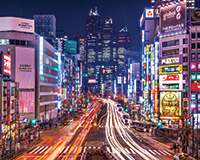 Real estate was at the heart of the infamous economic boom in Japan in the late 1980s. Loose monetary policy and a mantra that “the value of land will never go down” led to the price of commercial property in Tokyo rising by 104% in the four years to 1991. Then when the bubble burst, it crashed back down again, helping to create economic devastation.
Real estate was at the heart of the infamous economic boom in Japan in the late 1980s. Loose monetary policy and a mantra that “the value of land will never go down” led to the price of commercial property in Tokyo rising by 104% in the four years to 1991. Then when the bubble burst, it crashed back down again, helping to create economic devastation.
In 1990, the Nikkei stock market index stood at more than 40,000. Today, 25 years later, it is below 20,000.
When I started going to Tokyo regularly back in 2009, the hangover from the 1980s economic binge was still grinding away, compounded by the 2008 financial crash. I couldn’t keep up with the revolving door of prime ministers and then came the tsunami and the Fukushima disaster, which just seemed to add to the feeling of resigned sadness about the place.
New-found popularity
But then the new PM, Mr Abe, arrived in 2012 and all of a sudden Tokyo has become the most popular country for international real estate investors in Asia. Despite the rapidly ageing population and anaemic economic growth of less than 1% per year. Tokyo
is attracting far more international capital than younger, faster-growing markets such as Shanghai, Mumbai, Jakarta or even proven stalwarts such as Singapore and Hong Kong.
And the reason is, at least in part, cheap money. Provide any real estate community with plentiful debt at rates of less than 1% (fixed for five years) and the party will begin.
The first two of the “three arrows” of Abenomics (print money, spend money, reform things) have caused the inevitable asset price inflation with, for example, prime office yields tumbling from 4.5% in 2012 to 2.8% today (as an aside, the stock market is up 80% since PM Abe was elected).
Property deal volumes have soared from $19bn (£12.3bn) in pre-Abe 2011 to more than $43bn traded last year and international buyers are at the party. The proportion of foreign buyers has risen from 4% to 20% over the same period. It is tempting to conclude “here we go again” – loose monetary policy is creating an artificial boom and a bust will surely follow. But it is, of course, more complex than that.
The Abe stimulus package, at $130bn, is huge. Directionally, it is the same policy other mature economies are pursuing to try to stimulate economic activity after the great financial crisis.
The big gamble for many countries is whether real economic growth will ignite before the stimulus runs out. In our world of commercial real estate, this translates to whether sustained tenant demand will begin to push rents higher before interest rates and property yields increase.
In Tokyo, the occupational market is well balanced, with steady leasing demand meeting moderate vacancy levels. Office rents are rising slowly but they are still 40% lower than they were in 2008, suggesting that there is plenty of room for further growth. Capital values per square foot in both the commercial and residential sectors are around half of those in London.
The spread between prime property yields and the cost of debt is one of the highest in Asia Pacific. Again, this suggests that there is further room for growth.
The yen has fallen significantly since Mr Abe took office. This has created record profits for Japanese exporters and has also encouraged a surge of tourists and shoppers from China and elsewhere – all creating demand for space and upward pressure on rents.
It may be different this time
I am not nearly brave enough to conclude that “it’s different this time” but it is easily possible to argue a positive outlook for the Japanese property markets, at least in the medium term.
In the longer term, I guess Mr Abe’s third arrow of “reform” will have to be given increased attention – especially the reform of the labour markets to allow more flexibility, more immigration and some policies to encourage females into the workplace.











